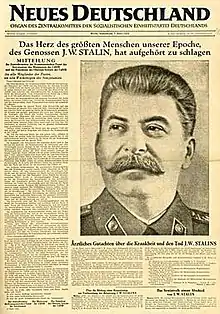Neues Deutschland
Neues Deutschland (nd; English: New Germany, sometimes stylized in lowercase letters) is a German daily newspaper, currently headquartered in Berlin.
.svg.png.webp) | |
| Type | Daily newspaper (Monday-Saturday) |
|---|---|
| Format | Rhenish (Between broadsheet and Berliner) |
| Owner(s) | Communio Beteiligungsgenossenschaft eG and Left Party |
| Publisher | Neues Deutschland Druckerei und Verlags GmbH |
| Editor-in-chief | Wolfgang Hübner |
| Founded | 23 April 1946 |
| Political alignment | Democratic socialism (post-1990) Stalinism/Marxism-Leninism (historical) |
| Language | German |
| Headquarters | Berlin, Germany |
| Circulation | 18,595 (Q1, 2020)[1] |
| Website | neues-deutschland.de |
For 43 years it was the official party newspaper of the Socialist Unity Party of Germany (SED), which governed East Germany (officially known as the German Democratic Republic) as a dictatorship, and as such served as one of the party's most important organs. It originally had a Stalinist political stance; it retained a Marxist-Leninist stance until German reunification in 1990.[2] The Neues Deutschland that existed in East Germany had a circulation of 1.1 million as of 1989 and was the communist party's main way to show citizens its stances and opinions about politics, economics, etc. It was regarded by foreign countries as the communist regime's diplomatic voice.
Since the fall of communism, the Neues Deutschland has lost 98 percent of its readership and has a circulation of 18,595 as of 2020. Between 2019 and 2020 the number of sold copies and subscriptions declined 14.8 percent.[3] Since 1990 the newspaper has changed its political outlook and now has a democratic socialist political stance. The newspaper is both politically and financially tied to one of its part owners, The Left (Die Linke), which owns the publishing house and printing presses.
East Germany

ND was formed in 1946[4] as a Lizenzzeitung after the Social Democratic Party of Germany (SPD) and the Communist Party of Germany (KPD) were forcibly merged to form the SED in the Soviet occupation zone of Germany. The first edition of ND was published on 23 April 1946 in conjunction with the founding of the SED. ND replaced the SPD organ Das Volk and the KPD organ Deutsche Volkszeitung. Karl Maron was the first chief editor of the daily and served in the post until 1950.[4]
Before the reunification of Germany in October 1990, ND had a circulation of a million and was second only to the youth newspaper junge Welt in readership. During this period the editor-in-chief of ND was Wolfgang Spickermann.[5] However, it has been claimed that Neues Deutschland failed to reach much of the East German population.[6]
After reunification
.jpg.webp)
After reunification, ND's readership diminished greatly. In 2020, ND had a circulation of 18,595. While most large newspapers in Germany have a problem with declining circulation, ND is particularly vulnerable in that the majority of its readers are over 60 years old. ND produces both a national edition and regional editions for Berlin and Brandenburg.
Jürgen Reents, who has political roots in both the Party of Democratic Socialism and the Green Party, has been the editor in chief of ND since 1999. One of his major goals has been to transform ND's image from a propaganda leaflet to a more respected newspaper. In October 2005 the editors moved from Elsenbrücke to Franz-Mehring Platz in Berlin. Three months later, Olaf Koppe took over management of the newspaper.
Each issue of the daily between 1945 and 1990 was digitalized by the Berlin State Library in June 2013.[2]
Profile
ND is now oriented towards a democratic socialist viewpoint and is owned partially by The Left party. The twin goals of the newspaper are to give those in eastern Germany a voice and to represent the democratic socialist viewpoint without being the organ of The Left or any other political party. While eastern German themes dominate the features and the community pages, the political section looks at leftist politics throughout Germany. Authors and politicians from diverse political backgrounds have also been represented on the pages of the newspaper. For example, Friedrich Schorlemmer, a known critic of The Left party and the political left in general, has been a guest writer.
Other traditional sections of a newspaper are also included, such as an advice page, a television guide, notifications and classifieds, opinion columns, and theme sections dealing with health, environment, and other issues. The letters to the editor are often cited as examples of viewpoints of the Left party from other media sources. As with most daily German newspapers, ND is published daily Monday through Friday, with a weekend edition published on Saturdays.
In November 2006, the newspaper also started a youth insert called Sacco and Vanzetti. Beginning in March 2007, ND started publishing online.
See also
References
- https://meedia.de/2020/04/22/ivw-blitz-analyse-tages-und-wochenzeitungen-zeit-gewinnt-erneut-auflage-welt-bricht-voellig-ein/
- Wilder, Charly (27 June 2013). "Digitizing the GDR: East German Papers Offer Glimpse of History". Der Spiegel. Retrieved 4 October 2013.
- https://meedia.de/2020/04/22/ivw-blitz-analyse-tages-und-wochenzeitungen-zeit-gewinnt-erneut-auflage-welt-bricht-voellig-ein/
- Caroline Schaumann (27 August 2008). Memory Matters: Generational Responses to Germany's Nazi Past in Recent Women's Literature. Walter de Gruyter. p. 255. ISBN 978-3-11-020659-3. Retrieved 28 April 2013.
- Lars Willnat (December 1991). "The East German press during the political transformation of East Germany". International Communication Gazette. 48. Retrieved 8 April 2015.
- Allinson, Mark (23 March 2000). Politics and Popular Opinion in East Germany, 1945-1968. Manchester University Press. p. 71. ISBN 978-0719055546.
External links
![]() Media related to Neues Deutschland at Wikimedia Commons
Media related to Neues Deutschland at Wikimedia Commons
- Official website (in German)
- Open access archive of Neues Deutschland / Berlin edition from 23 April 1946 to 3 October 1990 in the portal DDR-Presse of the Zeitungsinformationssystem (ZEFYS) of the [Berlin State Library]; access via xlogon.net (registration needed)